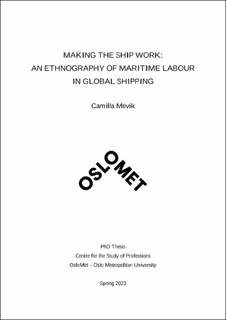| dc.description.abstract | This dissertation is an anthropological study of the organisation of maritime work and life among seafarers in different parts of the world. It discusses the labour experiences of seafarers, whose everyday work within a highly regulated, spatially bounded, and ethnically stratified work environment is an integral—even crucial—part of the global economy. Up to 90 percent of world trade is carried by the international shipping industry (George, 2013; ICS, n.d.a), which means that without movement and circulation at sea, ‘half the world would starve, and the other half would freeze’ (ICS, n.d.a). Despite the essential role that seafarers play in what is arguably the most globalised of all industries, the (non-) attention given to them and their work in operating the ships that carry goods across the world’s oceans is disproportionate to their importance. Based on ethnographic research conducted aboard a contemporary cargo vessel crewed by seafarers of mixed nationalities, this dissertation sheds light on the labour required to make a ship ‘work’ and demonstrates how explorations of the tensions between the standardised, formalised, and theoretical measures of work on the one hand and the individual, personal, experiential, and practical aspects of work on the other hand can offer a new perspective on maritime work. By investigating labour standardisation and bureaucratisation in shipping labour and the way in which this labour is organised and structured, this dissertation elucidates the ‘invisible’ work undertaken by seafarers, as well as the multiple ideologies that surround their work and work practices, and the everyday strategies that they implement to render their time at sea more bearable and sustainable. One of the central arguments of this study is that the formal structure of shipboard labour and its institutionalised organisation on the one hand and the informal structure of shipboard labour and its social organisation on the other hand intersect with and are interconnected with one another. In my exploration and analysis of onboard social relations and the everyday negotiation and organisation of work, I reveal how seafarers—despite their unequally distributed positions, power, and conditions of employment—manage to keep a vessel afloat and contribute to the apparently unimpeded transportation of goods.
Denne avhandlingen er en antropologisk studie av organiseringen av maritimt arbeid og liv blant sjøfolk på et lasteskip. Studien diskuterer arbeidserfaringene til sjøfolk, hvis daglige arbeid foregår innenfor et høyt regulert, romlig avgrenset og etnisk stratifisert arbeidsmiljø om bord skipet. Arbeidet er en integrert - til og med avgjørende - del av verdensøkonomien hvor opptil 90 prosent av verdenshandelen bæres av den internasjonale skipsfartsindustrien (George, 2013; ICS, n.d.a). Til tross for den viktige rollen sjøfolk spiller i det som er verdens mest globaliserte næringer er arbeidet de gjør om bord skipene som frakter varer over verdenshavene understudert. Gjennom etnografisk forskning utført ombord på et internasjonalt bemannet lasteskip, belyser denne avhandlingen det arbeidet som kreves for å få et skip til å ‘fungere’ og demonstrerer hvordan utforskninger av spenningene mellom standardiserte, formaliserte og teoretiske forståelser av arbeid, og de individuelle, personlige, erfaringsmessige og praktiske aspektene av arbeidet kan gi et nytt perspektiv på maritimt arbeid. Ved å undersøke arbeidsstandardisering og byråkratisering innen maritimt arbeid og måten dette arbeidet er organisert og strukturert på, belyser denne avhandlingen det ‘usynlige’ arbeidet som utføres av sjøfolk samt de mange ideologiene som omgir deres arbeid og arbeidspraksis, og de daglige strategiene de iverksetter for å gjøre tiden til sjøs mer utholdelig og bærekraftig. Et sentralt argument i avhandlingen er at den formelle strukturen for skipsarbeid om bord og dens institusjonaliserte organisering er nær forbundet med den uformelle strukturen for arbeid om bord og dens sosiale organisering. I min analyse av sosiale relasjoner om bord og den daglige forhandlingen og organiseringen av arbeidet, viser jeg hvordan sjøfolk – til tross for sine ulikt fordelte posisjoner, makt og ansettelsesvilkår – klarer å holde et fartøy flytende samt bidra til den tilsynelatende uhindrede flyten av global varetransport. | en_US |

